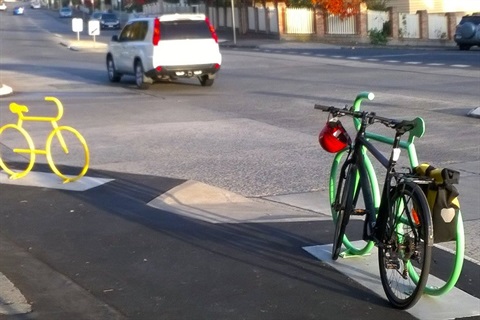City of Hobart launches workplace travel plan
Published on 04 August 2017

The City of Hobart has today launched a workplace travel plan aimed at improving travel choices for its employees’ journey to and from work.
Following a notice of motion by Alderman Marti Zucco in relation to strategies to alleviate peak traffic issues, the Council engaged the services of transportation consultants Mott McDonald to assist with preparing a travel action plan for City of Hobart employees.
Council spokesperson on the Travel Plan, Alderman Dr Eva Ruzicka said: “The City of Hobart is in the process of developing a new Transport Strategy. As part of that body of work, we needed to better understand city employee travel requirements.
“Council support for Alderman Zucco’s notice of motion enabled us to undertake an employee travel behaviour survey. Almost half of Council’s employees took part. Mott McDonald has analysed the survey results and developed an employee travel action plan.
“It is intended that the travel action plan will guide our efforts to reduce the impacts of our employees’ travel on the overall Hobart vehicle transport network. A key underlying demand was for improved public transport that suited diverse start and finish work times.
“We see the Travel Plan as a framework for other interested employers in the city. What can they find out to better understand their city worker travel patterns? Can they ultimately help to manage traffic congestion and get happy, instead of stressed employees arriving for work?” said Ald Dr Ruzicka.
Alderman Marti Zucco said: “Understanding the current travel modes and patterns of employees and their willingness and ability to consider other modes of transport for their journey to work was the first step in starting a conversation with our employees.
“Can they find a better way to get to work, can they consider walking, riding a bike, carpooling or catching public transport, even just as part of the journey?
“The Employee Travel Action plan provides for a range of activities including the promotion of transport options and end-of-trip- facilities, Greencard initiatives, a review of our flexible working policy, bike/public transport strategies and working with the State Government and public transport operators,” said Ald Zucco.
Alderman Dr Ruzicka said: “Changing people’s travel patterns requires innovative solutions as well as improving what is on offer. The Travel Plan will demonstrate how travel demand management and travel behaviour change can be implemented. If Council can further improve the proportion of active transport, public transport and car sharing for the City of Hobart’s workforce over the coming years, what can other city employers also do? We’d like to start the conversation.”
Key survey results:
- The survey completed by 290 staff sought responses to a range of questions, including employee start and finish times; approximate travel distance from home to work; mode of travel to and from work; and consideration of alternate modes of travel for personal and business purposes.
- Private vehicles make up the largest mode share at 28 per cent of all trips, but there is a diverse mix of travel modes amongst staff based at the Council Centre.
- Council Centre and Hobart Town Hall employees, who tend to commence work between 7am and 9am, have a high degree of access to public transport and relatively good access to bicycle facilities and have a much lower proportion of private motor vehicle use as a journey-to-work mode.
- The travel to work behaviours of Council staff employed in the CBD show strong support for walking, cycling, public transport and carpooling as the main methods of their journey to work.
- More than 45 per cent of employees at city locations either walked, used a bicycle or a bus for the journey to work. Around 15 per cent of employees used car sharing.
- Cleary’s Gates depot staff have a high proportion of private motor vehicle as the journey-to-work transport mode due to its location and the lack of public transport options available. Also, the normal work commencement time of crews is between 5am and 7am.
- The response to whether employees would change their mode of travel was positive. Employees said they would if there was improved service frequencies of public transport; there were discounts for using public transport services; there was an ability to work flexible hours or work from home.
- Staff also indicated that they were willing to consider carpooling/sharing.